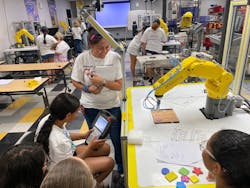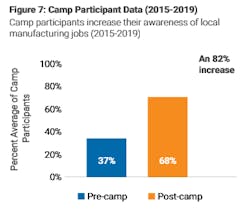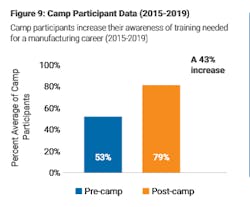Using Summer Camps to Create a Talent Pipeline
At first glance, there doesn’t seem to be a link between the Association for Packaging and Processing Technologies (PMMI) and summer STEM camps. However, on closer examination, an association that represents more than 950 North American manufacturers of equipment components is tasked with looking out for the best interests of these companies. And what could be more helpful than finding workers as these sectors, like every other manufacturing sector, faces acute talent shortages?
“As a national organization, it’s hard to create programs from a top-down approach so when I heard about the grassroots program called Nuts, Bolts& Thingamajigs, at a conference I was attending, I knew I hit upon exactly the right program that could get kids exciting about manufacturing as a career,” explains Stephan Girard, senior director of PMMI's Education & Workforce Development. PMMI has partnered with Nuts, Bolts and Thingamijigs, the charitable foundation for the Fabricators & Manufacturers Association to provide manufacturing summer camps for kids ages 12-16. The camp began in 2005.
What’s unique about the camp is that students get to experience current manufacturing capabilities by creating, building and taking a product home. It’s a well-rounded experience as the students have the opportunity to tour manufacturing facilities, speak to industry experts and even learn about entrepreneurship.
The camps involve a collaboration between the local host school, which is usually a community college, manufacturing companies and high schools. “The collaboration between these parties is what drives the potential talent pipeline as students learn the education path for this field as well as companies in their town that are looking for talent,” notes Girard. PMMI partnered with NBT in 2019 and held its first co/branded camps in 2021. This past summer PMMI supported 18 camps and the overall NBT held 168 camps. Some examples of camps include:
- Camp Innov@tion: Environmental Sustainability - Tech Valley High School
- Manufacturing and Machining Camp - Purdue University Northwest
- Robotics Camp - Manchester Community College
“A large part of the success is the program is project-based learning. The students understand how something is built and that’s a very exciting aspect of learning for the students. Walking through a plant they understand the processes and have the opportunity to talk with experts in the field. This direct learning is very valuable,” says Girard.
Camps are Having an Impact
To understand the effect of these camps on students, NBT issued a program impact study in 2020.
The report includes the following finding:
- NBT camps expose middle and early high school youth to manufacturing careers and increase their awareness of educational pathways and manufacturing jobs in their community.
- NBT camps provide a fun, engaging atmosphere for camp participants to learn new skills using manufacturing equipment and learn about courses and programs to continue building on those skills.
- NBT camps provide meaningful benefits to the schools and organizations that host camps and to the local manufacturers that sponsor and support the camps.
“Findings from the impact study validate what we at NBT have known for a while,” said Ed Dernulc, foundation director, in a statement. “Reaching individuals at the prime ages of 12 to 16 years old and exposing them to manufacturing jobs in their community is key to influencing their future career choices. The results prove to companies and prospective donors that NBT summer manufacturing camps are effective in building a pipeline for their skilled workforce of tomorrow.”
Change in Education?
Exploring different ways to educate students about manufacturing is part of an overall review that many parents, students and educational institutions are now undergoing. A broader view of what skills, certifications and training is needed for the field is being discussed.
“The education system is changing and you are seeing more high schools offering dual enrollment programs so that students have certifications and even some college credit when graduating high school. This can allow them to start right into the workforce. They can see if the field is right for them and always have the option for further education.” explains Girard. Whatever route students choose, Girard thinks summer camp is an excellent start. “This is a learning process for both the kids and their parents that we hope will spark an interest in our field.”



